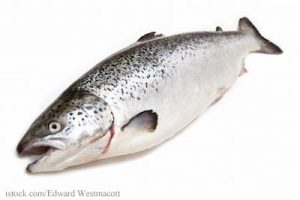On May 24, 2012, the U.S. Senate narrowly voted against an amendment to further study genetically modified salmon before it is put into commerce, 46 – 50. Sixty votes were required for the bill to pass.
 The amendment, sponsored by Senator Lisa Murkowski (R-Alaska) would have “required environmental and economic impact studies of the first generally engineered animal in the human food supply,” according to a press release by the California Right to Know Campaign.
The amendment, sponsored by Senator Lisa Murkowski (R-Alaska) would have “required environmental and economic impact studies of the first generally engineered animal in the human food supply,” according to a press release by the California Right to Know Campaign.
The salmon, created by AquaBounty Technologies, has been engineered to contain a growth hormone gene from the Chinook salmon and a genetic switch from an eel-like creature, the press release states. The growth hormone makes the salmon grow twice as fast as normal.
The engineered female fish will be made sterile by inducing “triploidy”, so the cells that make eggs do not develop properly. In addition, containment measures at the land aquaculture facilities have multiple redundant barriers in place to prevent egg and/or fish movement to wild aquatic environments.
Even so, environmentalists are concerned that these fish could damage wild fisheries if they get into the ocean and may out-compete wild salmon for food or mates. “We need to look before we leap here, and make that a long hard look,” Murkowski said in a press release. “That means we not only make sure that genetically-engineered salmon is healthy to put into our bodies and doesn’t endanger our fishery resources, but also that it is healthy to our coastal environments and economies. We need to fill in all the blanks before we put Frankenfish on our plates.”
Stacy Malkan of the California Right to Know Campaign has talked to Food Poisoning Bulletin before about this issue. That organization has successfully put a GMO labeling measure on the fall ballot in California. She said, “Filling in the blanks also includes informing consumers, via labels, about whether they are eating genetically engineered foods.”
In fact, although the FDA gave preliminary approval to AquAdvantage salmon in 2010, saying “except for minor issues to be addressed … the information provided by ABT … is acceptable and complete”, an FDA advisory committee has determined that more research is needed.
Polls show that an overwhelming majority of Americans from all demographics and both major political parties want to know if their food contains genetically engineered ingredients. More than 40 other countries require these types of labels, according to the press release.




